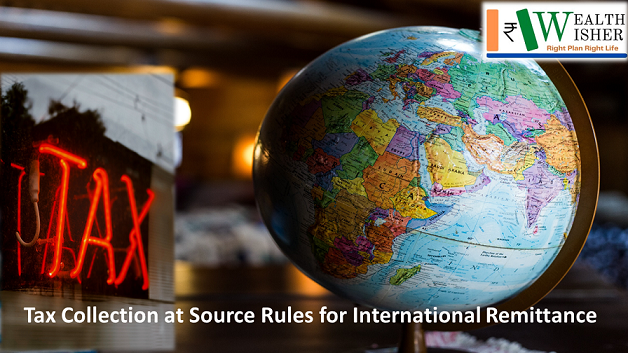New TCS Rates for Remittance will apply from Oct 01, 2023. Outward Remittances of beyond INR 7 Lakh, will attract a TDS of 20%. The previous TDS Rate was 5%. (Except payments made for Education or medical purposes). So let’s check the details of this new rule of 20% New TCS Rates on Remittance internationally.
So, under the new rule, all outward remittances under LRS will have 20% TCS with few exceptions. This is the added burden of Deducting Tax at Source before making the payment to say a foreign vendor.
Under LRS we all know that RBI allows a remittance of USD 2.5 L every year.
Section 206C, sub-section 1G of the Income Tax Act, 1961, allows for TCS collection on LRS transactions. Tax Collected at Source (TCS) is the tax collected by the seller from the buyer at the time of sale to deposit it to the tax authorities.
The person who collects the TCS must have Tax Collection Account Number otherwise the person will not be able to collect the TCS.
New TCS Rates on Remittance

Pls Note:
Threshold Limit of ₹7 Lakh is the aggregate limit for the foreign remittances mentioned at Sr. No. 2, 3, and 4 for the entire financial year i.e. starting from 1 April 2023 till 31 March 2024. Also note, this limit of ₹7 Lakh is separate from the limit provided in Sr. No. 1 for overseas tour package.
All Foreign Remittances done through Debit Cards, shall be subject to TCS at 20%, if the total amount of foreign remittance from all modes (i.e. whether from branches, debit cards, etc.) exceeds the threshold limit of ₹7 Lakh. Thus, to avoid higher rate of TCS for remittances mentioned at Sr. No. 2 and 3 in the above table, you may execute such foreign remittances from the nearest branches of bank of your choice.
Bank have started insisting that customers shall mandatorily submit a declaration at the time of every foreign remittance confirming whether the aggregate amount of foreign remittance which they have done (including the current transaction) through the Bank and Other Bank/(s) exceeds the prescribed threshold limit and provide the requisite details in the declaration.
Some Clarifications-
Medical Purposes
For an explanation let me tell you what comes under the Medical Purposes.
The circular also defines this. It means the outward remittance to cover the cost of treatment, medicines, other day-to-day costs of treatment, and purchasing tickets for the patients & one attendant.
Education Purposes
Educational Purpose means all expenses related to the course attended. It includes tuition fees, a Person’s ticket cost, all other fees paid to the institution, and day-to-day living costs.
Overseas Tour Travel Package
The term ‘overseas tour program package’ would be defined as, “any tour package which offers a visit to a country/countries/territory/territories outside India and includes expenses for travel or hotel stay or boarding or lodging or any other expenditure of similar nature or in relation thereto”.
Hence if the individual purchases an international travel ticket or makes payment of only a hotel accommodation, this would not be covered within the definition of ‘overseas tour program package’.
Central Board of Direct Taxes has cleared this in a circular dated June 30. It says “An overseas tour program package must have at least two of the following: International travel ticket. Hotel accommodation (with or without food)/boarding/lodging. Any other expenditure of similar nature or in relation thereto”.
Can this 20% New TCS Rates on Remittance be Reduced or Escaped for Remittance?
One cannot escape this as this is part of your ITR, not it can be reduced to a lower level.
TCS is just tax collected at source… it is not the final income tax that you pay. It is just like an advance payment. This can be applied for refunds at the end of the year while filing for tax.
Form 26 AS lists TCS as a tax credit.
Bonus Tip for Parents Who want to Send More than Rs 7 Lakh for Overseas Education
The amount can be divided between parents & major siblings (also HUF if you have one). Each one of them has a limit of 7 Lakh per year. Also, you can divide the amount between 2 Financial Years. Say one in Jan & second in April. Sending them at intervals helps as every FY limit is 7 Lakh.
These rules & limits on New TDS Rules for Remittance will help you manage your tax issues and save additional payments. Do message us if you need more help on this subject – New TCS Rates on Remittance.








